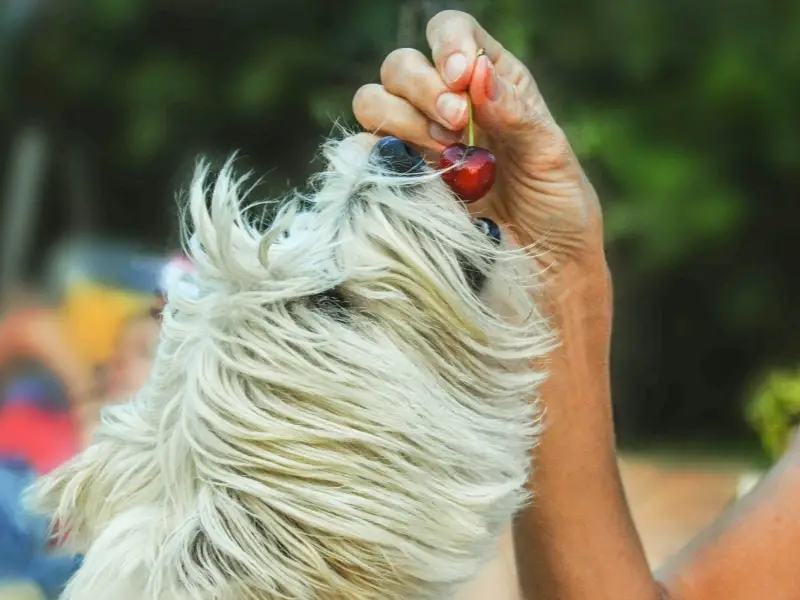Juicy, sweet, and full of essential vitamins and antioxidants, cherries can be a healthy summer treat. But while cherries can be extremely good for you are they safe for your pooch too?
So, can dogs eat cherries? NO, dogs shouldn’t eat cherries! While the cherry flesh is safe for dogs to eat, the leaves, pits, and stems contain cyanide which is toxic to dogs. When ingested, cherry pits can cause intestinal obstruction, especially in small dogs. There’s no reason to risk feeding cherries to your dog.
In this article, we’ll tell you what are the risks of feeding cherries to your dog, and what you should do if your pooch manages to steal some. Keep on reading to find out more!
Are Cherries Good for Dogs?

Technically, the flesh of the cherry is safe for dogs to eat. Cherries are a good source of vitamins A and C, and also contain fiber and antioxidants which can be beneficial for dogs.
As far as health benefits go, cherries can reportedly control blood sugar, improve heart health, and even offer pain relief (source). However, your dog would have to eat a large number of cherries to receive any of these benefits and that is where things get tricky.
Unfortunately, one cherry has around one gram of sugar which can cause an upset stomach and diarrhea in dogs.
If you remove the pit, stems, and any leaves first the flesh of the cherry can be a sweet and tasty dog treat. However, cleaning and pitting cherries can be a huge hassle, considering that your dog won’t get any significant nutritional benefits from eating cherry fruit.
While feeding cherries to your dog might seem like a good idea on paper, in reality, the risks of eating cherries outweigh any potential benefits.
If you believe that your pooch can benefit from eating cherry flesh as a treat, talk to your vet first. They will be able to tell you whether or not you should feed your dog cherries and suggest a safer alternative.
Risk of Feeding Cherries for Dogs

Even if your dog has eaten cherries in the past without experiencing any side effects, you shouldn’t feed cherries to them. There are many other fruits, such as blueberries and bananas that are safe for dogs and make a far better choice than cherries.
As mentioned earlier, cherries can cause more harm than good to your dog, and aren’t worth the risks! The main dangers of cherries for dogs are:
1. Cyanide Poisoning
The biggest danger of cherries lies in their pits, stems, and leaves which contain cyanide. Eating a single cherry pit won’t cause cyanide poisoning, but consuming a large amount of cherries can be fatal.
If your dog has eaten multiple cherries, you should watch your pooch for signs of cyanide toxicity. The most common symptoms of poisoning are labored breathing, dilated pupils, and bright red gums (source).
If your dog experiences any of these symptoms call your vet right away or take your pooch to an emergency vet clinic. The vet will most likely try to induce vomiting to prevent lethal cyanide toxicity.
2. Intestinal Obstruction
If your dog eats a whole cherry while you aren’t looking, don’t panic right away. Eating a single cherry pit won’t cause cyanide poisoning, but it can lead to intestinal blockage.
Small breed dogs are especially at risk of suffering from intestinal obstruction after ingesting a small cherry pit. While the risk of blockage is lower in large breeds, you should watch your dog for any signs of intestinal trouble.
The most common symptoms of intestinal obstruction include vomiting, decreased appetite, and constipation (source). Keep in mind, dogs can develop these symptoms 24 hours after ingesting a cherry pit, so monitor your dog carefully.
3. High Sugar
There are many different kinds of cherries including maraschino, bing, black, and rainier. While maraschino cherries don’t have pits, they, like all other kinds of cherries, have a high sugar count.
Eating excess sugar can be extremely bad for dogs and lead to obesity, digestive problems, diabetes, and even cavities. With about one gram of sugar per fruit, eating cherries can quickly cause a spike in your dog’s blood sugar levels, so it’s best to err on the side of caution.
How Many Cherries Will Kill a Dog?
Unfortunately, there is no way of knowing how many cherries can prove fatal for any individual dog. Eating one or two cherry pits won’t cause cyanide poisoning in dogs, however, there is a chance that your dog may suffer from an intestinal blockage.
Bear in mind, smaller dog breeds are at a higher risk of developing cyanide toxicity and intestinal obstruction than larger breeds. But that doesn’t mean that larger dogs aren’t at risk too.
What to Do If Your Dog Eats a Whole Cherry?
If your dog manages to steal a single cherry while you aren’t looking, don’t start panicking right away! As mentioned earlier, one cherry pit won’t cause cyanide poisoning, but it can pose a risk of intestinal blockage.
You should monitor your dog for 24 hours at least, and look for symptoms of intestinal obstruction. If your pooch has a decreased appetite, constipation, or starts to vomit, take them to the vet right away.
If it turns out that your dog has an intestinal blockage, your vet will have to perform surgery to remove the cherry pit from your pup’s intestines.
After ingesting a whole cherry most dogs develop symptoms of cyanide poisoning within 15 to 20 minutes. If your dog has difficulty breathing, dilated pupils, or bright red gums call your vet right away or take your dog to a clinic.
Conclusion
While the flesh of the cherry isn’t toxic and can be a good source of fiber and vitamins, you shouldn’t feed cherries to your dog. Cherry pits, stems, and leaves contain cyanide and are potentially fatal when consumed in large amounts.
Ingesting a whole cherry with a pit can lead to intestinal blockage, especially in small breed dogs. Ultimately, the risks of feeding cherries to your dog outweigh any potential benefits, and you should consider other fruits and veggies as safer alternatives.
Related Articles:


0 Comments